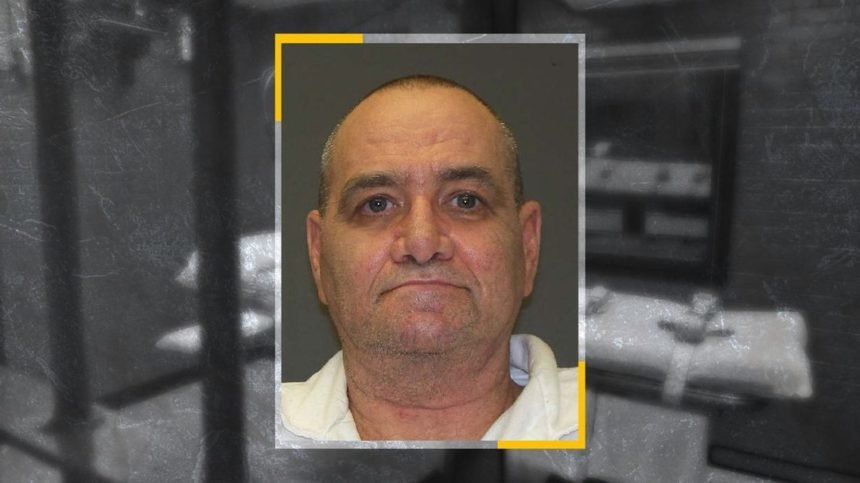Texas carries out nation’s first execution of 2020 for man who killed wife

HUNTSVILLE, Texas — A Texas inmate with a history of violence against women was executed Wednesday evening for fatally shooting his wife, who had feared she would never get out of her marriage alive.
John Gardner, 64, received a lethal injection at the state penitentiary in Huntsville for the January 2005 slaying of Tammy Gardner. Prosecutors said the couple was getting divorced when Gardner broke into his wife’s North Texas home and shot her in the head as she was sitting in bed. She died two days later at a hospital.
Asked by the warden if he had a final statement, Gardner, strapped to the death chamber gurney, turned his head and apologized several times to his wife’s son, daughter and mother, who watched through a window a few feet away.
“I would like to say sorry for your grief,” he said. “I hope what I’m doing today will give you peace, joy, closure, whatever it takes to forgive. I am sorry. I know you cannot forgive me, but I hope one day you will.”
After telling several friends watching through an adjacent window that he loved them, he apologized again, adding that he didn’t want to talk a lot and would ask the warden to go forward with his punishment because “I want to see the Lord Jesus so bad.”
Shortly after the lethal dose of the powerful sedative pentobarbital began, Gardner took three deep breaths and then began snoring. Within seconds, all movement stopped. He was pronounced dead at 6:36 p.m. CST, 16 minutes later.
Gardner became the first inmate put to death this year in Texas and the U.S. Seven other executions are scheduled in the next few months in Texas, the nation’s busiest capital punishment state. Last year, 22 inmates were executed in the U.S., with nine inmates being put to death in Texas, the most of any state.
His appellate attorneys had asked the U.S. Supreme Court to intervene, alleging his trial lawyers were ineffective, particularly for failing to present evidence Gardner suffered from “abandonment rage,” a condition Gardner claims causes men to kill their female companions with excessive force when faced with recent or imminent abandonment.
The Supreme Court denied the petition on Monday. Seth Kretzer, one of Gardner’s attorneys, said he was “deeply saddened” by the Supreme Court’s decision. No other appeals were filed by his attorneys.
“For those of us who are foot soldiers in the long war for conviction integrity, the struggle continues, the hope endures and the spirit never dies,” Kretzer said.
Prosecutors at trial described the marriage between John and Tammy Gardner as short but violent. She was Gardner’s fifth wife. The couple married in 1999.
“He was a classic abuser,” said Curtis Howard, who was one of the prosecutors for the Collin County District Attorney’s Office.
Friends and family of Tammy Gardner, 41, testified she lived in constant fear of John Gardner, who would hit and choke her and threaten her with a gun. Tammy Gardner had wanted to divorce her husband but told her boss at a wholesale horse-equipment company, “I can’t leave, he will kill me.”
In December 2004, Tammy Gardner filed for divorce after borrowing money from her company to do so.
At work, she marked Feb. 7, 2005 on her calendar, the date her divorce would be final. She would go over to the calendar and say, “You’re almost there. You’re almost there,” according to trial testimony.
“She was on pins and needles … hypervigilant, looking out for him,” said Howard, who is now an attorney for the Plano police department.
But sometime between 11 p.m. and midnight on Jan. 23, 2005, just 15 days before the divorce became final, John Gardner, who drove from Mississippi, broke into her home in Anna, Texas, located about 45 miles (72.42 kilometers) north of Dallas, and shot her in the head as she was sick in bed.
Despite being shot and unable to hear, Tammy Gardner called 911 and told a dispatcher her husband had shot her and he had left in a white pickup truck with Mississippi plates.
She was hospitalized but went into a coma and was taken off life support two days later.
In the petition before the Supreme Court, Lydia Brandt, one of Gardner’s attorneys, had argued that if evidence of abandonment rage would have been presented at trial, it would have humanized him “thereby providing a basis for a sentence of less than death.”
Howard said the theory would not have made a difference at trial because abandonment was not related to all of his many acts of violence, which included shooting his second wife, who was pregnant at the time and later died from resulting injuries, abducting his third wife at knifepoint and savagely beating his third wife’s daughter.
Howard said in his career he prosecuted three death penalty cases and two of them were related to intimate partner violence.
“This is one of those tragedies that we see in Texas all too often,” he said.
